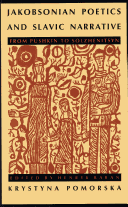Sound and Meaning: The Roman Jakobson Series in Linguistics and Poetics
1 total work
Krystyna Pomorska (1928-1986), a noted specialist of Slavic literature and literary theory, is best known for her pioneering work in applying Roman Jakobson's theories of poetics to prose narratives. This collection draws together and makes accessible her writings over two decades (among them articles appearing in English for the first time), and treats a wide range of Slavic literary works, including Pushkin, Tolstoy, Pasternak, Chekov, and Solzhenitsyn, as well as examples from Polish and Ukrainian literature and folklore.
Forming an intellectual and methodological whole, these essays reveal Pomorska's commitment to the principles of Jakobsonian poetics, her consistent application of these basic theoretical concepts to the analysis of literary works, and her interest in the foundations and history of literary criticism. Pomorska explores problems in both poetics (of prose as well as poetry) and literary theory, especially the relationship between biography and myth.
In Krystyna Pomorska, structuralism found a most able practitioner, and Jakobson's oeuvre an authoritative exponent and interpreter. Her volume, a guidebook to a major strain in modern criticism, will be of great interest to a broad audience of literary theorists and students of Slavic literatures and literature in general.
Forming an intellectual and methodological whole, these essays reveal Pomorska's commitment to the principles of Jakobsonian poetics, her consistent application of these basic theoretical concepts to the analysis of literary works, and her interest in the foundations and history of literary criticism. Pomorska explores problems in both poetics (of prose as well as poetry) and literary theory, especially the relationship between biography and myth.
In Krystyna Pomorska, structuralism found a most able practitioner, and Jakobson's oeuvre an authoritative exponent and interpreter. Her volume, a guidebook to a major strain in modern criticism, will be of great interest to a broad audience of literary theorists and students of Slavic literatures and literature in general.
